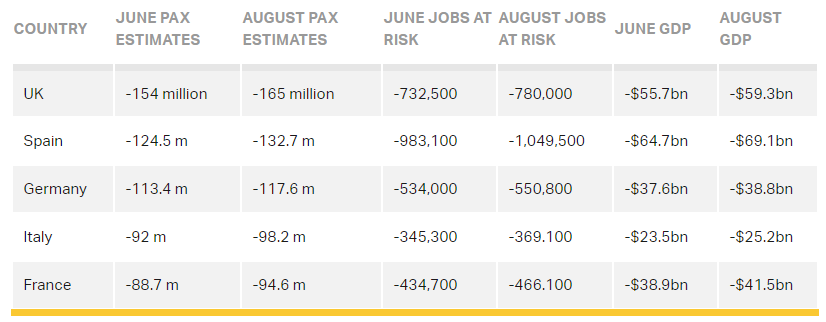The European market has seen an increase in the number of flights in recent months, supported by the reopening of borders between countries of the Schengen area and the non-Schengen EU states, but flight levels are still more than -50% below the same period in 2019. IATA says for the full year passenger numbers are currently forecast to be down by around -60%, which represents about 705 million passenger journeys.
The near-term outlook for recovery in Europe remains highly uncertain with respect to the second wave of the pandemic and the broader global economic impact it could have. IATA has already offered its projections for the global industry and acknowledges that similarly passenger demand in Europe is expected to recover gradually and will not reach 2019 levels until 2024.
With air travel not recovering as originally hoped, IATA says the negative impact on employment has increased. More than seven million jobs supported by aviation (including tourism) in Europe are now at risk (up from around the six million level it estimated in Jun-2020).
"It is desperately worrying to see a further decline in prospects for air travel this year, and the knock-on impact for employment and prosperity. It shows once again the terrible effect that is being felt by families across Europe as border restrictions and quarantine continue," says Rafael Schvartzman, IATA's regional vice president for Europe.
IATA has reinforced its call urging governments to coordinate to lift border restrictions and find alternatives to quarantine measures to avoid further economic damage. "It is vital that governments and industry work together to create a harmonized plan for reopening borders," explains Mr Schvartzman.
Worryingly, IATA's latest analysis of full-year impact estimates for the largest European markets shows a decline across all metrics since its previous projections in mid-June.

There is certainly mounting uncertainty in the European market as a growing number of nations start requiring travellers to undergo reapplied two-week quarantines after travel from an increasing number of countries. Ryanair has said bookings have "weakened over the last ten days" and influenced it to cut flight capacity by a fifth through Sep-2020 and Oct-2020.
The budget carrier confirms most cuts would be frequency reductions and not route closures, heavily focused on Spain, France and Sweden, where rising coronavirus cases have led to increased travel restrictions. Ryanair says "proper testing at airports, and effective tracing…is the only realistic and proportionate method of supervising safe intra-EU air travel while effectively limiting the spread of the Covid-19 virus."
At the end of last month, Europe's airline and airport associations wrote to Prime Ministers, Transport, Health and Home Affairs Ministers across the European Union, Schengen and the UK, setting out deep concerns over their failure to implement coherent and science-based approaches to travel restrictions.
The letter, sent jointly from Airports Council International Europe (ACI Europe), Airlines for Europe (A4E) and IATA, was highly critical of the introduction of new restrictions relating to selected countries. Many of these restrictions, state the organisations, are inconsistent with the principles laid out by the World Health Organization (WHO) and the European Centre for Disease Prevention and Control (ECDC).
Despite repeated calls for a science-based, harmonised and coordinated approach to new restrictions - differing national approaches have emerged. The associations say some of these unilateral national measures are "contrary to expert guidance and further damage consumer confidence". Moreover, the imposition of such restrictions "fails to take into account other options governments have to protect their citizens," such as effective track-and-trace systems.
On the existing measures that are currently being adopted they said: "We fail to see any valid science-based and proportionate justification for such restrictions from a health policy perspective". You can read the full letter here.
Meanwhile, in an attempt to ensure similar standards among its member airlines IATA has released an airline self-assessment health checklist to support the International Civil Aviation Organization's (ICAO) 'Take-off: Guidance for Air Travel through the Covid-19 Public Health Crisis'. The Take-off guidance is the global standard framework of risk-based temporary measures for governments and the air transport value chain for safe operations during the Covid-19 crisis.
A harmonised approach to health is seen as key not only to the recovery of civil aviation but also to ensuring the future resilience of the aviation network. It will also help to negate concerns of travellers over the different procedures and information being adopted and shared, making them feel comfortable to travel.
IATA's health checklist for airlines will help support the standards and recommended practices (IHSARPs), associated guidance material and other supporting information necessary for an operator to self-assess aspects of the traveller journey, including pre-arrival notification; check in; embarkation and disembarkation; aircraft cleaning; onboard air quality; in-flight operations; flight and cabin crew safety; and airport facilities.
This process will also be an important component in boosting momentum for the implementation of the ICAO Council Aviation Recovery Task Force (CART) recommendations aimed at providing practical, aligned guidance to governments and industry operators in order to restart the international air transport sector and recover from the impacts of Covid-19 on a coordinated global basis.